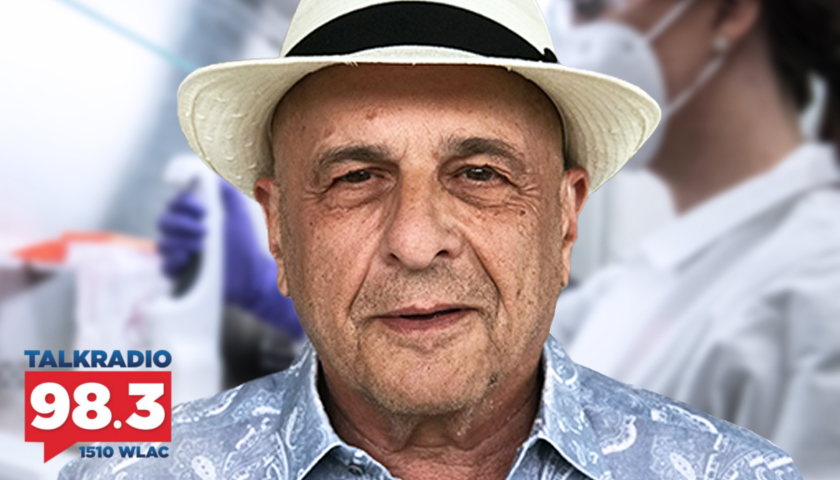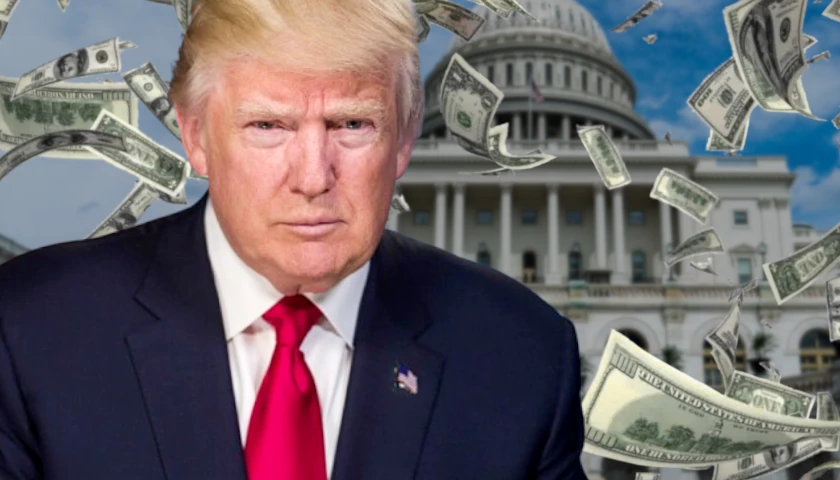Live from Music Row Thursday morning on The Tennessee Star Report with Michael Patrick Leahy – broadcast on Nashville’s Talk Radio 98.3 and 1510 WLAC weekdays from 5:00 a.m. to 8:00 a.m. – host Leahy welcomed all-star panelist and senior editor-at-large at The Epoch Times Roger Simon in-studio to weigh in on the federal government’s distribution control of monoclonal antibody treatment in comparison Ron DeSantis’ example of going direct with GlaxoSmithKline.
Leahy: That is Vanderbilt University’s Kimmel Park, who’s in charge of the administration of monoclonal antibodies infusions there. Roger, we’re looking at all of this mess and lack of clarity on it.
I do have something that is of note. This is in our lead story by Chris Butler The Tennessee Star, which is the following headline, which says two big pharmaceutical companies sell monoclonal antibodies to the federal government only.
Refused to sell the hospitals or states. And you say, oh, how could they do that? Well, it turns out the two companies are Regeneron a big pharmaceutical company, and an even bigger one called Eli Lilly.
Simon: Yes, the biggest. One of the biggest. These are two that have emergency use authorization from the Food and Drug Administration which is not like approval. It’s like a step before that.
But in that emergency use authorization, the Food and Drug Administration said they can only distribute it through the federal government. Why on earth they did that Roger, I have no idea.
Simon: Oh yes you do. Unfortunately. And that’s the world we live in.
Leahy: What’s your theory on that?
Simon: It’s called communism. And unfortunately, that’s where we’re going at the speed of light it seems.
Leahy: This is why it becomes so confusing because under the emergency use authorization for these monoclonal antibiotic treatments made by Regeneron and Eli Lilly, our Chris Butler contacted them and they said we’re only selling to the federal government.
We will not sell the hospitals or states. And then they cited this emergency use authorization. Here’s where the rub comes in. The federal government then determines how to distribute it to state governments.
Simon: That’s why we are where we are. And that’s why DeSantis is doing a terrific thing by going to GlaxoSmithKline another company that also makes monoclonal antibodies.
Leahy: Here’s the twist in the story.
Simon: All right, I’m listening.
Leahy: I’m trying to unravel this mystery. You’re a mystery writer, right? Here’s a mystery that’s perhaps a setting for your next novel. So here’s the mystery on this. The FDA has to give an emergency use authorization.
They’ve done it for Regeneron and Eli Lilly, but in that EUA, they can only have it distributed through the federal government.
It turns out subsequently, in May, it’s in our lead story that the FDA granted emergency use authorization to a monoclonal antibody product used for the treatment of COVID-19, manufactured by GlaxoSmithKline and a company called VIR Biotechnology.
It’s a joint venture between them. The authority goes to GlaxoSmithKline now so they can make it. And the study is highly effective. But here’s what’s interesting about it.
I went in and I looked at that emergency use authorization letter, and I looked for where that letter would say, you can only distribute through the federal government. I don’t see it in that letter.
Simon: That’s interesting because that’s why obviously DeSantis went to them directly.
Leahy: If it’s true.
Simon: It’s true that they’re able to sell it without going through the federal government because they’re doing it in the state of Florida.
Leahy: Has he succeeded in securing a contract? I know he was talking to them, but I don’t know if he has a contract. This is where people’s eyes glaze over when you get into this.
When you don’t have a free market on these things, and there are reasons why these kinds of pharmaceuticals have to go through a more controlled process.
I understand that. But the way this particular product is being distributed by these two vendors is not a free market at all. It gives all the power and control to the federal government, which is not using it well.
Simon: We used to call that in the literary trade MEGO. My eyes glazeth over. Speaking of which, here’s another interesting mystery for you on a related subject. Are the Pfizer at Moderna jabs really vaccines at all?
Leahy: If you listen to Alex Berenson, you know, the former New York Times science writer. He’s written many books about this. You see him on Tucker all the time.
Simon: Oh, yeah.
Leahy: I think he argues that it’s not a traditional vaccine. But this is interesting about all this. You try to figure out what the rules are, and I’ve been trying to figure out and I’m looking right now at the letter of authorization the FDA gave to GlaxoSmithKline, and it says they can use authorized distributors.
Not just the federal government. I’m looking at it right now. GlaxoSmithKline and authorized distributors will ensure the authorized labeling will accompany the authorized.
Simon: And who does the authorizing?
Leahy: I think the authorized distributor is GlaxoSmithKline who authorizes it as opposed to the others where it’s authorized by the feds. Now, what I don’t know, Roger, is how much of this have they produced. I don’t know.
Simon: If we could go directly to DeSantis’s office, they would probably respond.
Leahy: So here’s my question. It looks like states and hospitals can go directly, based upon my preliminary analysis and reading the letter while on the air, that you could go directly to GlaxoSmithKline and buy this. This is what Ron DeSantis in Florida is doing. My question to you, Roger is why isn’t Bill Lee doing it?
Simon: That was why I originally wrote to Lee’s office and got the response that we just read on the line. That was my question to them.
And I didn’t really get a direct response on that other than we’re looking into this. And I hope they really are because it’s everybody’s life who’s listening to this show that’s on the line.
Leahy: It’s my life! I can tell you that. We’re both over $65.
Simon: You are? You don’t look a day over 63. (Leahy laughs) If you really want to go into the weeds, I have in my medicine cabinet now Ivermectin.
Leahy: You are getting in the weeds. There are reports and I haven’t verified entities. It’s very controversial about the use of that in COVID-19.
Simon: Less controversial than it would seem. If you really do the reading and you know about a place called Uttar Pradesh is a part of India, and the population of Uttar Pardesh is about two-thirds of the United States. In other words, it’s big.
Leahy: It’s pretty big.
Simon: They have very little COVID. They don’t treat with vaccines. They only treat with Ivermectin.
Leahy: It’s anecdotal.
Simon: Not exactly because 240 million people is a big anecdote.
Leahy: (Chuckles) This is why we have you on. You are so pithy.
Simon: It is very hard to get Ivermectin in this country. It’s very easy to get Ivermectin almost everywhere else in the world. Why did it suddenly become hard?
Leahy: Why is that?
Simon: I think for similar reasons that we are becoming one of the most advanced Communist countries in the history of man. Is what it is.
Leahy: I use the word fascist more. It’s the control of the federal government and large corporations. You think?
Simon: Correct. The Epoch Times has up now a video by Joshua Philip, who’s been doing a fantastic job of studying the differences between fascism and communism. And they are very small.
Leahy: Very small. Under fascism, they co-opt large corporations, which basically get to run a little bit more on their own because they’re going to make more money that way. They don’t take them over and have, like, an apparatchik.
Simon: It’s a running scale. And you have China, of course, today is you might call it more like fascism, but it’s going back to being communism. It’s all very confusing. On the other hand, what it is is totalitarian.
Leahy: That is exactly correct. And on that cheery note, I don’t take a break and come back.
Listen to the full third hour here:
– – –
Tune in weekdays from 5:00 – 8:00 a.m. to the Tennessee Star Report with Michael Patrick Leahy on Talk Radio 98.3 FM WLAC 1510. Listen online at iHeart Radio.
Photo “Roger Simon” by Roger Simon.





